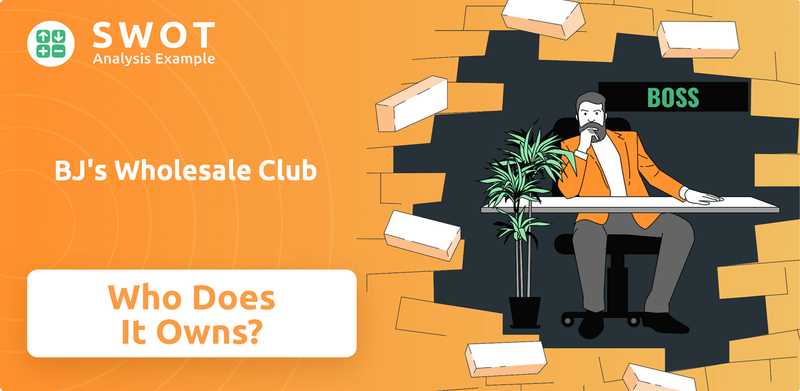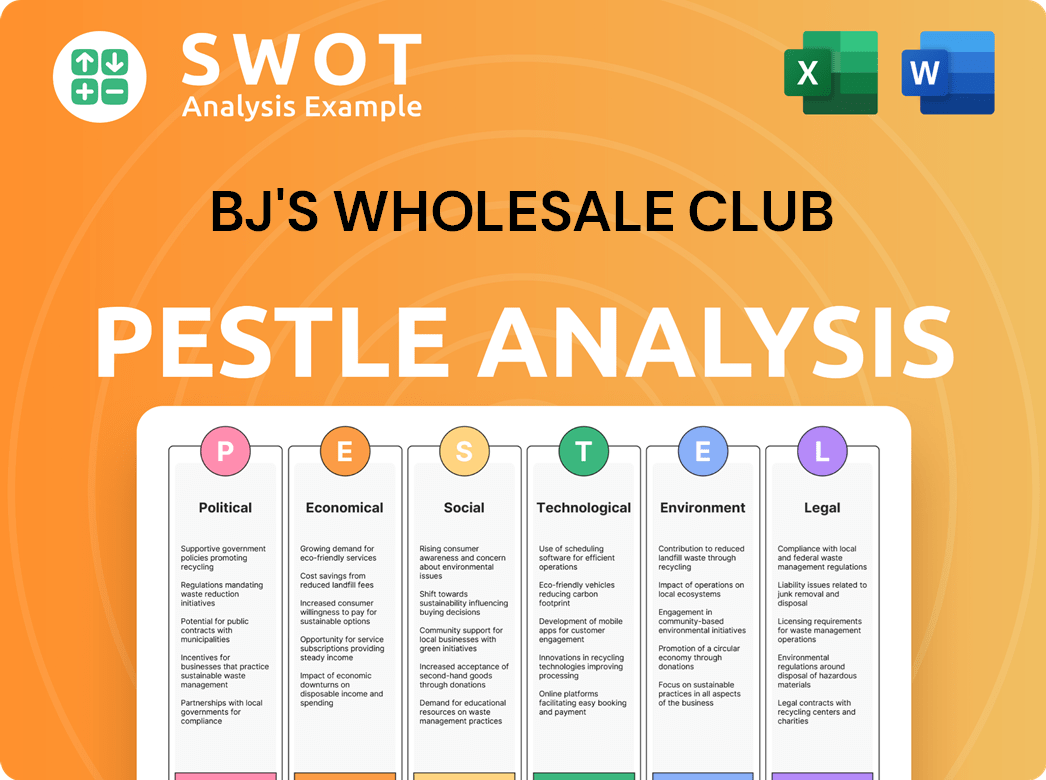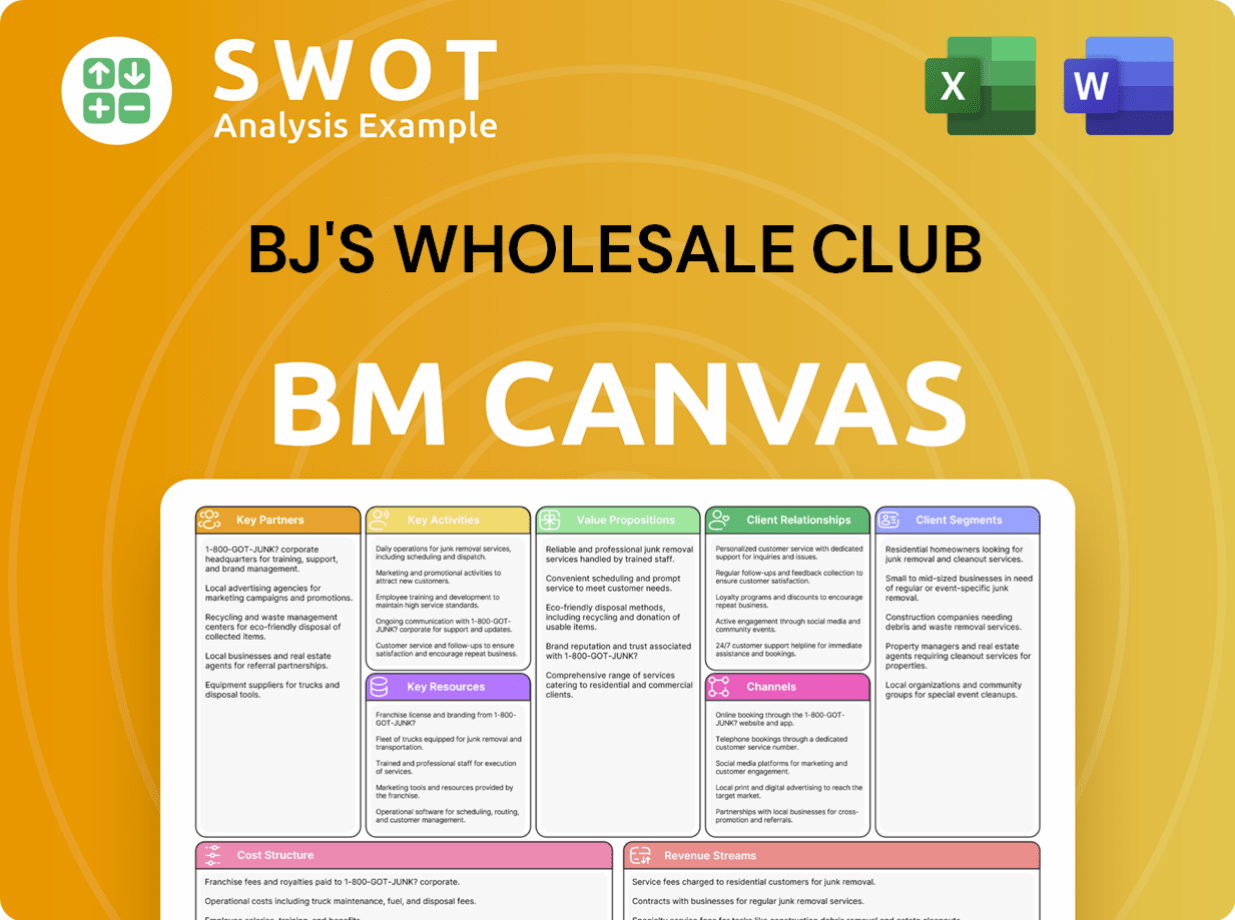BJ's Wholesale Club Bundle
Who Really Owns BJ's Wholesale Club?
Understanding the ownership structure of a company is paramount for investors and strategists alike. BJ's Wholesale Club, a major player in the warehouse retail sector, has a fascinating ownership journey, marked by shifts from private equity to public markets. Knowing who owns BJ's is crucial for assessing its future trajectory and understanding its strategic priorities.

From its origins as a subsidiary to its current status as a publicly traded entity, BJ's Wholesale Club's ownership has evolved significantly. This article will explore the key players in BJ's Wholesale Club SWOT Analysis. We'll examine the influence of private equity, the impact of its IPO, and the current landscape of its shareholders. Gaining insights into the BJ's ownership structure provides a comprehensive understanding of this retail giant.
Who Founded BJ's Wholesale Club?
The story of BJ's Wholesale Club begins in 1984, rooted in the vision of Mervyn Weich, then president of Zayre Corp. The warehouse club concept was conceived and launched under his leadership. This marked the initial phase of BJ's history, setting the stage for its future growth.
BJ's ownership structure and early development were closely tied to its parent company, Zayre Corp. The initial funding and resources came directly from Zayre, providing the financial backing necessary for BJ's Wholesale Club to establish itself in the market. The company leveraged Zayre's existing retail expertise.
The name of the company itself has a personal touch, derived from the initials of Mervyn Weich's daughter, Beverly Jean Weich. This detail provides insight into the early stages of the company's identity and its connection to its founders.
Mervyn Weich, the president of Zayre Corp., played a key role in the initial launch of BJ's Wholesale Club. He was instrumental in the conception and early development of the warehouse club concept. His vision helped shape the initial direction of the company.
Zayre Corp., as the parent company, provided the necessary financial resources to launch BJ's Wholesale Club. This included the capital needed for initial operations and expansion. This financial backing was crucial for establishing the warehouse club.
The name "BJ's Wholesale Club" comes from the initials of Mervyn Weich's daughter, Beverly Jean Weich. This personal touch highlights the human element behind the company's founding. It's a detail that adds a unique aspect to the company's origin.
In 1987, John Levy took over as president, succeeding Mervyn Weich. This transition marked a change in leadership during the early years of the company. It was a key moment in BJ's history.
In 1989, Zayre Corp. divested its namesake stores and was renamed The TJX Companies, Inc. This reorganization placed BJ's Wholesale Club under a new corporate structure. It influenced the company's early corporate structure.
As a subsidiary of Zayre Corp., BJ's Wholesale Club benefited from the parent company's resources and retail experience. This support was crucial during the initial stages of the company's development. It helped establish the warehouse club concept.
The early years of BJ's Wholesale Club saw significant changes in its ownership structure. Initially a subsidiary of Zayre Corp., the company later became part of The TJX Companies, Inc. This shift reflects the evolving corporate landscape and strategic decisions made during that period. Understanding these changes is essential for grasping the full scope of BJ's ownership journey.
- BJ's Wholesale Club was launched in 1984 as a subsidiary of Zayre Corp.
- Mervyn Weich, then president of Zayre, was the key figure in the company's launch.
- In 1989, Zayre Corp. was renamed The TJX Companies, Inc., which included BJ's Wholesale Club.
- The initial funding and resources came directly from Zayre Corp.
BJ's Wholesale Club SWOT Analysis
- Complete SWOT Breakdown
- Fully Customizable
- Editable in Excel & Word
- Professional Formatting
- Investor-Ready Format

How Has BJ's Wholesale Club’s Ownership Changed Over Time?
The ownership of BJ's Wholesale Club has seen significant changes over time. Initially, it was a part of The TJX Companies. In August 1997, it became an independent, publicly traded company on the New York Stock Exchange (NYSE) under the ticker symbol 'BJ', which gave it operational freedom. This was a key moment in the evolution of BJ's Wholesale Club's ownership, setting the stage for its future growth and strategic direction.
A major shift occurred in 2011 when BJ's was taken private by Leonard Green & Partners and CVC Capital Partners for about $2.8 billion. These private equity firms invested $630 million in equity. After a period of private ownership, BJ's returned to the public market in 2018 with a second Initial Public Offering (IPO), raising around $638 million. This IPO helped reduce debt and fund expansion, highlighting the dynamic nature of BJ's ownership structure.
| Event | Date | Details |
|---|---|---|
| Spin-off from The TJX Companies | August 1997 | Became an independent, publicly traded company. |
| Acquisition by Private Equity | 2011 | Taken private by Leonard Green & Partners and CVC Capital Partners for approximately $2.8 billion. |
| Second IPO | 2018 | Returned to being a public company, raising around $638 million. |
Currently, BJ's Wholesale Club Holdings, Inc. is a publicly traded company, with institutional investors holding the majority of shares. As of May 2025, institutional investors hold approximately 64.42% to 87.33% of the company's stock, with some reports indicating 106.62% institutional holding in May 2025. Major shareholders include Vanguard Group Inc, Fmr Llc, and BlackRock, Inc. Insiders have decreased their holdings to 0.71% as of May 2025. The company's market capitalization as of June 13, 2025, is $14.61 billion, representing a 425.68% increase from its IPO in June 2018.
The ownership of BJ's Wholesale Club has evolved significantly, from being part of a larger company to private equity ownership and then back to being publicly traded.
- Institutional investors are the primary owners.
- The company's market capitalization has grown substantially since its 2018 IPO.
- Understanding the ownership structure is key to assessing the company's financial performance.
BJ's Wholesale Club PESTLE Analysis
- Covers All 6 PESTLE Categories
- No Research Needed – Save Hours of Work
- Built by Experts, Trusted by Consultants
- Instant Download, Ready to Use
- 100% Editable, Fully Customizable

Who Sits on BJ's Wholesale Club’s Board?
The current board of directors of BJ's Wholesale Club plays a vital role in the company's governance and strategic direction. As of June 2024, Dave Burwick joined the board, serving on the Nominating and Corporate Governance Committee. Key members of the leadership team include Bob Eddy, who serves as Chairman of the Board, President, and Chief Executive Officer, a position he has held permanently since April 2021 and was named Chairman in June 2023. Other executives include Laura Felice (Executive Vice President and Chief Financial Officer, appointed in April 2021), Monica Schwartz (Executive Vice President, Chief Digital Officer, joining in August 2020), and Anjana Harve (Executive Vice President, Chief Information Officer, named to her position in September 2023). Directors include Rob Steele (since 2016), Marie Robinson (since 2023), and Michelle Gloeckler (since 2019).
The board's composition reflects a mix of experience, with directors having varying tenures. This structure helps to provide both continuity and fresh perspectives in guiding the company's operations and strategic initiatives. Understanding the board's structure is essential for anyone interested in BJ's ownership and its future direction. To learn more about the company's background, you can read Brief History of BJ's Wholesale Club.
| Board Member | Title | Year Joined |
|---|---|---|
| Bob Eddy | Chairman of the Board, President, and CEO | 2021 (CEO), 2023 (Chairman) |
| Laura Felice | Executive Vice President and Chief Financial Officer | 2021 |
| Monica Schwartz | Executive Vice President, Chief Digital Officer | 2020 |
| Anjana Harve | Executive Vice President, Chief Information Officer | 2023 |
| Dave Burwick | Director | 2024 |
| Rob Steele | Director | 2016 |
| Marie Robinson | Director | 2023 |
| Michelle Gloeckler | Director | 2019 |
Regarding voting power, holders of BJ's Wholesale Club common stock are entitled to one vote per share. The election of directors is determined by a plurality of the votes cast. After the 2018 IPO, private equity owners initially retained a significant stake, giving them a majority on all shareholder votes. The company amended its Certificate of Incorporation in 2020 to phase out the classification of its board of directors, with directors now elected to one-year terms starting from the 2021 annual meeting. Following the complete declassification of the board at the 2022 annual meeting, directors can be removed with or without cause. This structure ensures that BJ's shareholders have a direct say in the company's leadership and strategic direction.
The board includes experienced members guiding the company's strategy.
- Bob Eddy is the Chairman, President, and CEO.
- Shareholders have one vote per share.
- Directors are elected to one-year terms.
- The board is fully declassified.
BJ's Wholesale Club Business Model Canvas
- Complete 9-Block Business Model Canvas
- Effortlessly Communicate Your Business Strategy
- Investor-Ready BMC Format
- 100% Editable and Customizable
- Clear and Structured Layout

What Recent Changes Have Shaped BJ's Wholesale Club’s Ownership Landscape?
In the past few years, BJ's Wholesale Club has shown consistent growth. For the fiscal year 2024, ending February 1, 2025, the company reported strong financial results, including increased membership and growth in digital sales. The first quarter of fiscal 2025, ending May 3, 2025, saw net income rise to $149.8 million, compared to $111.0 million in the first quarter of fiscal 2024, and Adjusted EBITDA increased by 20.9% to $285.8 million.
Regarding BJ's ownership, institutional investors continue to hold a dominant position. As of June 12, 2025, there were 1279 institutional owners and shareholders, collectively holding 182,019,124 shares. Major investors include Vanguard Group Inc, Fmr Llc, and BlackRock, Inc. While institutional holdings remained relatively stable at 106.62% in May 2025, mutual funds increased their holdings from 88.63% to 89.01% in February 2025. Insiders have slightly decreased their holdings, from 0.72% to 0.71% in May 2025. The company's financial performance and BJ's Wholesale Club stock information are key indicators for understanding BJ's ownership structure.
| Metric | Fiscal Year 2024 (Ending Feb 1, 2025) | Fiscal Q1 2025 (Ending May 3, 2025) |
|---|---|---|
| Net Income (millions) | N/A | $149.8 |
| Adjusted EBITDA (millions) | N/A | $285.8 |
| Institutional Ownership (as of May 2025) | 106.62% | N/A |
The company's strategic moves include a share repurchase program and a membership fee increase. On November 18, 2024, a new share repurchase program was approved, authorizing up to $1.0 billion of outstanding common stock, set to expire in January 2029. In the first quarter of fiscal 2025, the company repurchased 55,000 shares totaling $6.2 million. In addition, a membership fee increase, the first in seven years, took effect on January 1, 2025. For more information on the company's strategy, you can read about the Target Market of BJ's Wholesale Club.
Institutional investors, such as Vanguard Group and BlackRock, hold a significant portion of BJ's ownership. These major investors influence the company's direction and strategic decisions.
The company's first quarter of fiscal 2025 showed a rise in net income to $149.8 million and an increase in Adjusted EBITDA by 20.9%, indicating strong financial health and growth.
The company actively repurchases its shares, with a new program approved for up to $1.0 billion. This strategy can boost shareholder value.
Effective January 1, 2025, the company increased its membership fees. This strategic move is expected to boost future revenue.
BJ's Wholesale Club Porter's Five Forces Analysis
- Covers All 5 Competitive Forces in Detail
- Structured for Consultants, Students, and Founders
- 100% Editable in Microsoft Word & Excel
- Instant Digital Download – Use Immediately
- Compatible with Mac & PC – Fully Unlocked

Related Blogs
- What are Mission Vision & Core Values of BJ's Wholesale Club Company?
- What is Competitive Landscape of BJ's Wholesale Club Company?
- What is Growth Strategy and Future Prospects of BJ's Wholesale Club Company?
- How Does BJ's Wholesale Club Company Work?
- What is Sales and Marketing Strategy of BJ's Wholesale Club Company?
- What is Brief History of BJ's Wholesale Club Company?
- What is Customer Demographics and Target Market of BJ's Wholesale Club Company?
Disclaimer
All information, articles, and product details provided on this website are for general informational and educational purposes only. We do not claim any ownership over, nor do we intend to infringe upon, any trademarks, copyrights, logos, brand names, or other intellectual property mentioned or depicted on this site. Such intellectual property remains the property of its respective owners, and any references here are made solely for identification or informational purposes, without implying any affiliation, endorsement, or partnership.
We make no representations or warranties, express or implied, regarding the accuracy, completeness, or suitability of any content or products presented. Nothing on this website should be construed as legal, tax, investment, financial, medical, or other professional advice. In addition, no part of this site—including articles or product references—constitutes a solicitation, recommendation, endorsement, advertisement, or offer to buy or sell any securities, franchises, or other financial instruments, particularly in jurisdictions where such activity would be unlawful.
All content is of a general nature and may not address the specific circumstances of any individual or entity. It is not a substitute for professional advice or services. Any actions you take based on the information provided here are strictly at your own risk. You accept full responsibility for any decisions or outcomes arising from your use of this website and agree to release us from any liability in connection with your use of, or reliance upon, the content or products found herein.